Unit 12 What did you do last weekend? Section A 2d-3c课件(共有PPT21张,含音频)
文档属性
| 名称 | Unit 12 What did you do last weekend? Section A 2d-3c课件(共有PPT21张,含音频) | 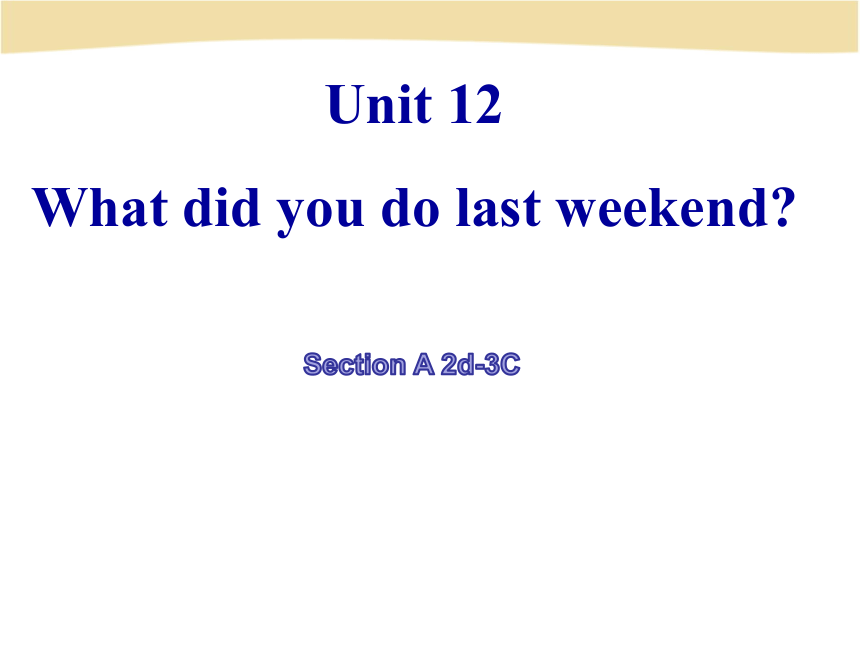 | |
| 格式 | zip | ||
| 文件大小 | 2.6MB | ||
| 资源类型 | 教案 | ||
| 版本资源 | 人教新目标(Go for it)版 | ||
| 科目 | 英语 | ||
| 更新时间 | 2022-02-25 10:36:11 | ||
图片预览

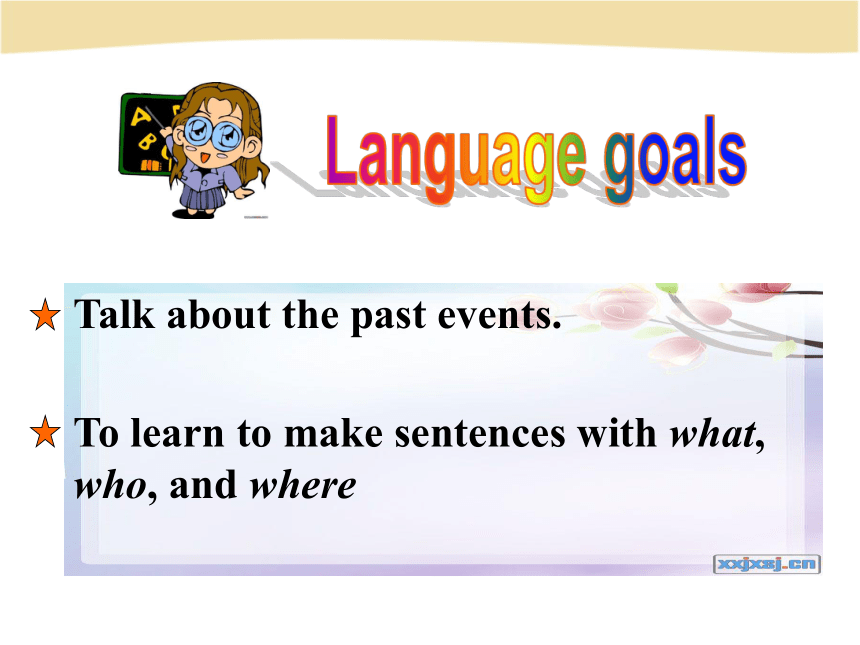
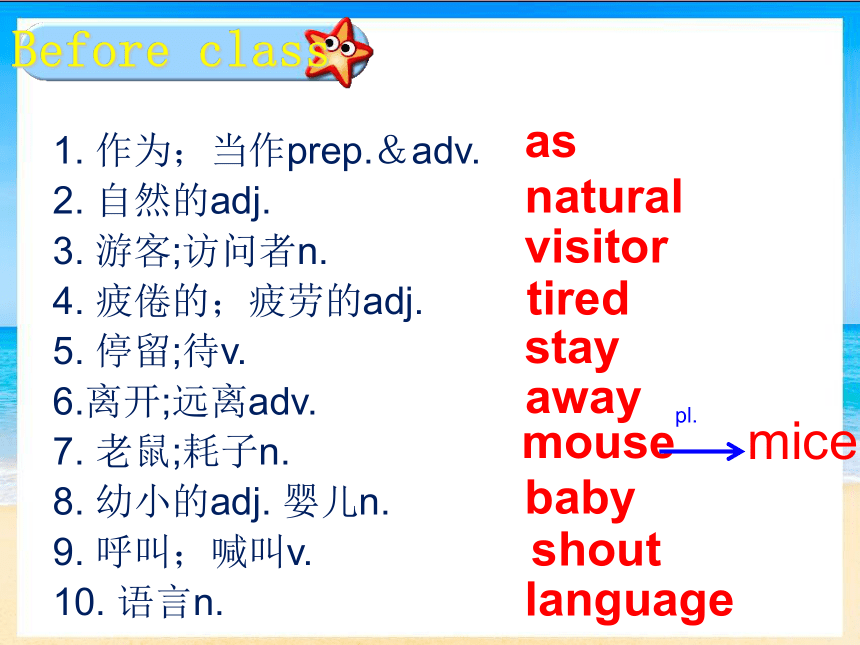
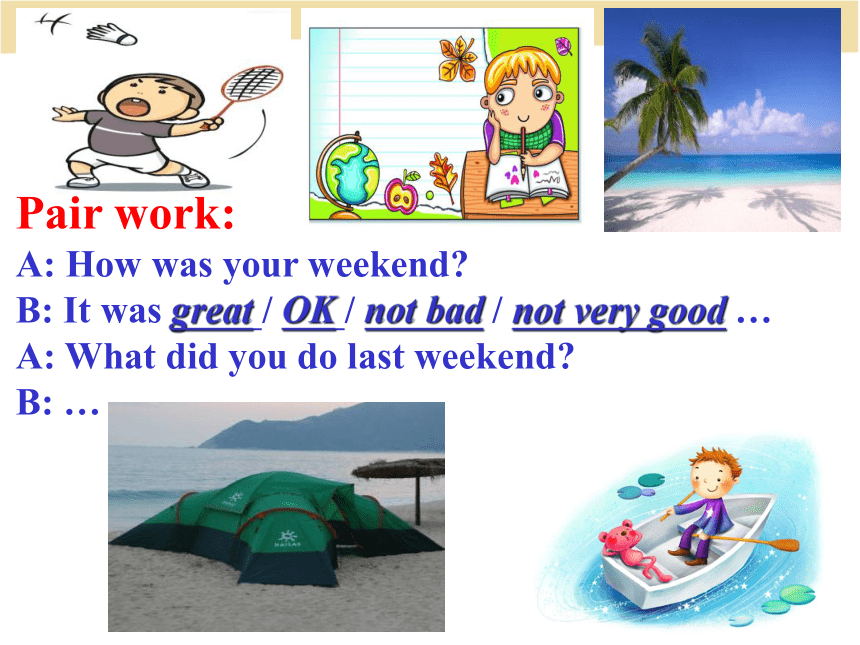
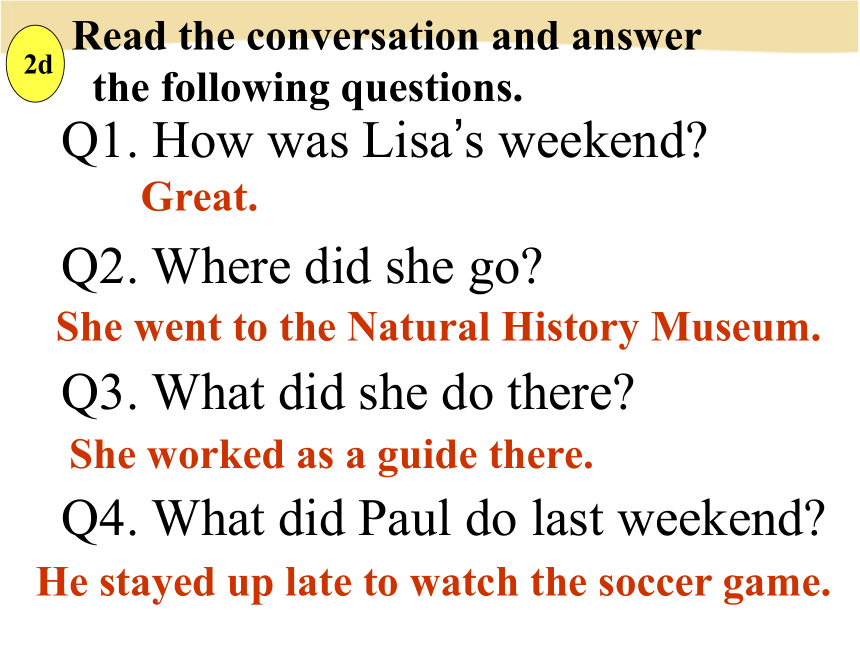
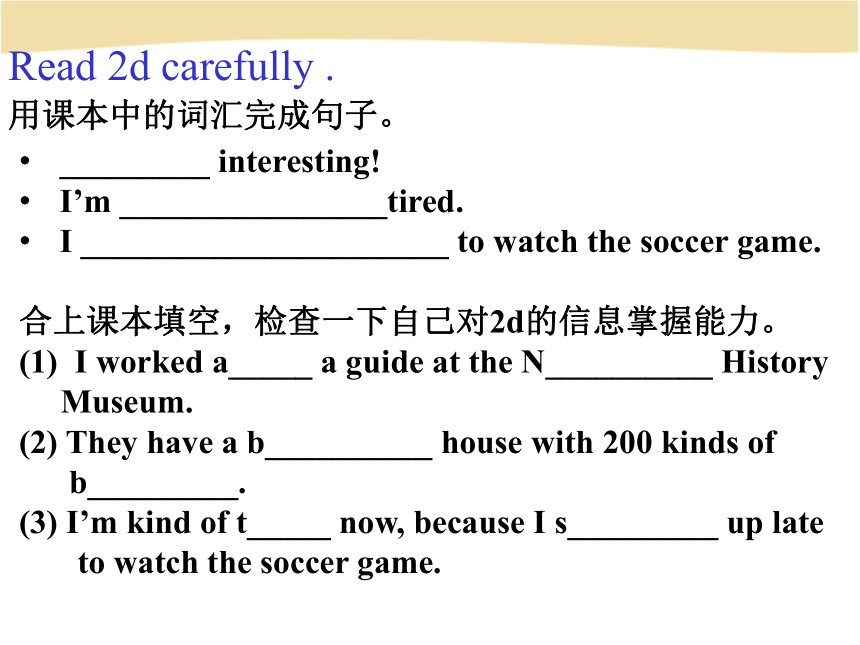
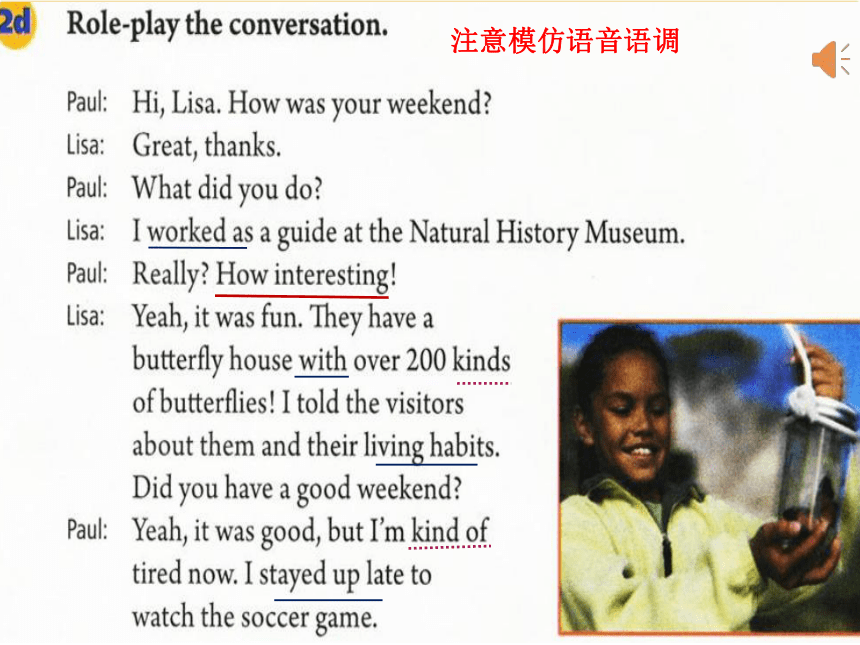
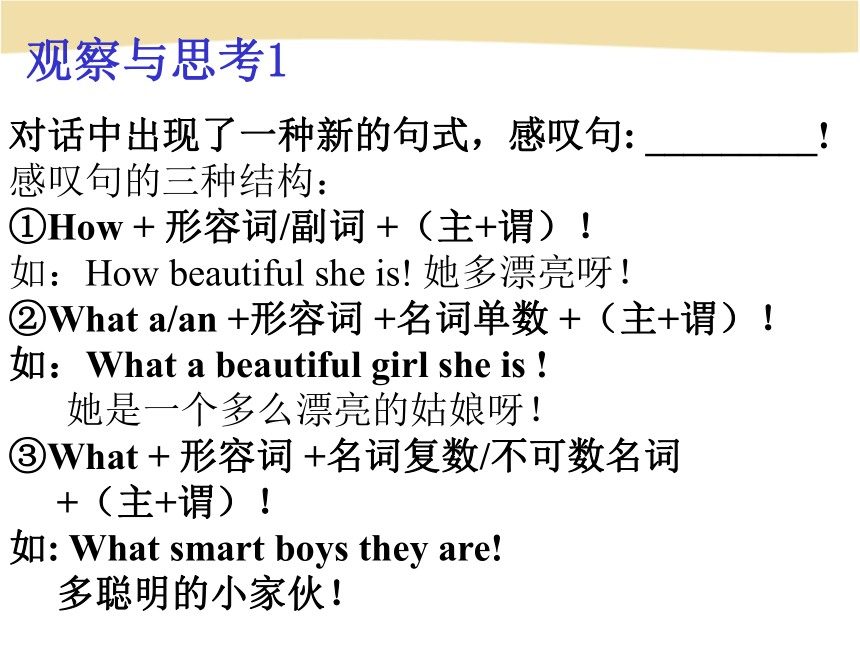
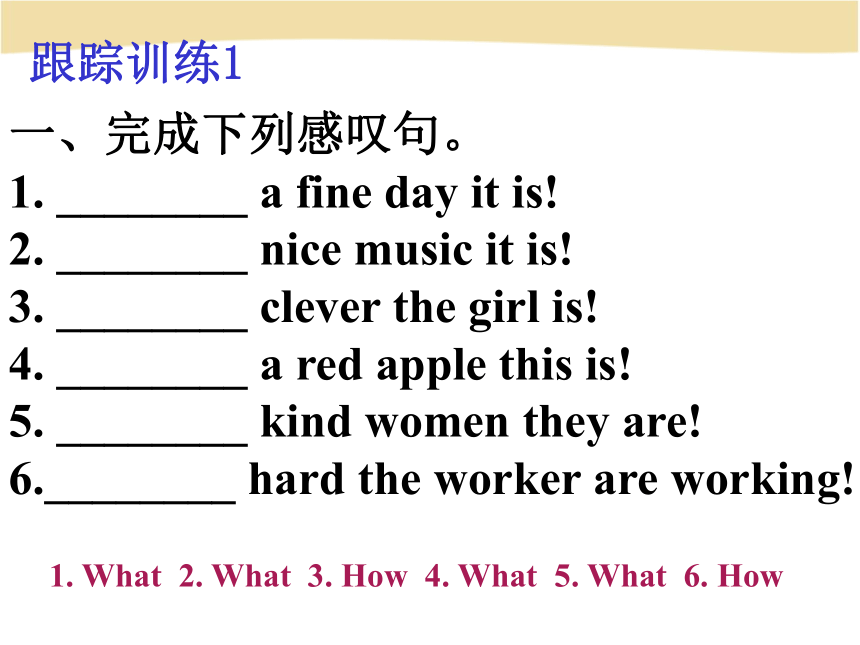
文档简介
(共21张PPT)
Unit 12
What did you do last weekend
Section A 2d-3C
Language goals
Talk about the past events.
To learn to make sentences with what, who, and where
Before class
1. 作为;当作prep.&adv.
2. 自然的adj.
3. 游客;访问者n.
4. 疲倦的;疲劳的adj.
5. 停留;待v.
6.离开;远离adv.
7. 老鼠;耗子n.
8. 幼小的adj. 婴儿n.
9. 呼叫;喊叫v.
10. 语言n.
as
natural
visitor
tired
stay
away
mouse
baby
shout
language
mice
pl.
Pair work:
A: How was your weekend
B: It was great / OK / not bad / not very good …
A: What did you do last weekend
B: …
2d
Read the conversation and answer
the following questions.
Q1. How was Lisa’s weekend
Q2. Where did she go
Q3. What did she do there
Q4. What did Paul do last weekend
Great.
She went to the Natural History Museum.
She worked as a guide there.
He stayed up late to watch the soccer game.
_________ interesting!
I’m ________________tired.
I ______________________ to watch the soccer game.
合上课本填空,检查一下自己对2d的信息掌握能力。
(1) I worked a_____ a guide at the N__________ History
Museum.
(2) They have a b__________ house with 200 kinds of
b_________.
(3) I’m kind of t_____ now, because I s_________ up late
to watch the soccer game.
Read 2d carefully .
用课本中的词汇完成句子。
注意模仿语音语调
观察与思考1
对话中出现了一种新的句式,感叹句: _________!
感叹句的三种结构:
①How + 形容词/副词 +(主+谓)!
如:How beautiful she is! 她多漂亮呀!
②What a/an +形容词 +名词单数 +(主+谓)!
如:What a beautiful girl she is !
她是一个多么漂亮的姑娘呀!
③What + 形容词 +名词复数/不可数名词
+(主+谓)!
如: What smart boys they are!
多聪明的小家伙!
一、完成下列感叹句。
1. ________ a fine day it is!
2. ________ nice music it is!
3. ________ clever the girl is!
4. ________ a red apple this is!
5. ________ kind women they are!
6.________ hard the worker are working!
跟踪训练1
1. What 2. What 3. How 4. What 5. What 6. How
1.定义:
1) 表示过去某个时间发生的动作或存在
的状态,常和表示过去的时间状语(如yesterday,
last night, in 1990, two days ago,just now...)连用;
2) 也表示过去经常或反复发生的动作, 常和表示
频度的时间状语(如often, always…)连用。
一般过去时
1. 上个周末你做什么了?
__________________________
我做了我的家庭作业。 / 我们去划船了。
__________________ /_______________
2. 谁去探望了她的奶奶?
_____________________
是蓓基。 _________
阅读Grammar Focus部分,完成下列句子。
I did my homework.
What did you do last weekend
We went boating.
Who visited her grandma
Becky did.
3. 上个周末她去了哪里? ___________________________
她去了农场。
____________________________
4. 她和谁一起去的?
____________________________
她和她的同学们一起去的。
____________________________
Where did she go last weekend
She went to the farm.
Who did she go with
She went with her classmates.
Discuss 1:
对动作、某物提问时,疑问词用_______。
★对地点提问时,疑问词用_______。
★对时间提问时,疑问词用________。
★对人物提问时,疑问词用______。
★对原因提问时,疑问词用______。
★对过去动作的方式提问或对事物/人的评价时,疑问词用______。
what
where
when
who
why
how
如何使用特殊疑问词
Fill in the blanks with who, what,
when, where, or how.
1. A: _____ did you do last weekend
B: I played badminton on Saturday.
A: Sounds fun.____ did you play with
B: I played with my father. He’s really good!
What
Who
Work on 3a
2. A: _____ was your weekend
B: It was great. I had so much fun.
A: _____ did you go
B: The weather was beautiful, so I went to the
beach with my parents.
3. A:_____ did Jim lose
B: He lost his keys. He often loses things.
A: That’s too bad._____ did he lose them
B: I heard it was yesterday.
How
Where
What
When
A family of mice were in the kitchen on
Saturday morning when they ______ a big
cat. Baby Mouse_____ afraid and _______
onto his father’s back. Father Mouse shouted at the cat, “ Woof, woof!” The cat quickly________. “Wow, Dad, you’re good!”______ Baby Mouse. “Well, son, that’s why it’s important to learn a second language,” answered Father Mouse.
saw
was
climbed
ran away
said
plete the passage with the correct
forms o f the words in the box..
say be climb see run away
教材解读
A family of mice were in the kitchen on Saturday morning when they saw a big cat.
a family of mice意为“老鼠一家”。Mouse 意为“老鼠”其复数形式为mice。family n.家,家庭,家里人。 family 作“家里人”讲时,指所有家庭成员,此时谓语动词用复数形式。family作“家,家庭”讲时谓语动词用单数形式。
My family all like sports.我们全家人都喜欢运动
I have a big family.我有个大家庭。
2. Father Mouse shouted at the cat,“Woof, woof!”
【辨析】 shout at ,shout to
shout at多指因为生气愤怒或其他原因等而对某人大喊大叫。shout to 一般指因距离远而不得不大声叫喊让别人听见,无感情因素。
It is noisy here.You should shout _____ ( to/at)him.
Don't shout ____ (at/to) me.
3.Well, son, that’s why it’s important to learn a second language,…
◆It is + adj.+ to do…是固定句型。
It's difficult for me to study math.
It's easy for children to read the book.
◆a second language 意为“另外一门语言”,a second 表示“再(一),又(一)”。
Can you do it a second time 你能再做一次吗
一、单词拼写。
1. Miss Li is a good________(向导)for this tour.
2. I think our English class was __________(有趣的).
3. The boy _______ (丢失)his keys last weekend.
4. Baby Mouse was ________ (害怕).
5. It’s important to learn a second__________(语言).
课堂练习
1. guide 2. interesting 3. lost 4. afraid 5. language
二、根据汉语意思完成句子。
1.上周末你做了些什么事?
_______did you ______ ______ _______
2. 他昨天去划船了。He _____ _______ __________.
3. 谁看望了她的奶奶?who ________ her _________
4. 我在自然历史博物馆做导游。
I ___ ____ a guide at Natural History Museum.
5. 我想熬夜写作业。
I want _____ ______ _____ _____ to do homework.
6. 丽莎告诉游客有关蝴蝶的生活习性。
Lisa told the _____ _____butterflies’ _____ ____.
What ;do last weekend 2. went boating yesterday 3. visited; grandma
4. worked as 5. to stay up late 6.visitors about; living habits
Unit 12
What did you do last weekend
Section A 2d-3C
Language goals
Talk about the past events.
To learn to make sentences with what, who, and where
Before class
1. 作为;当作prep.&adv.
2. 自然的adj.
3. 游客;访问者n.
4. 疲倦的;疲劳的adj.
5. 停留;待v.
6.离开;远离adv.
7. 老鼠;耗子n.
8. 幼小的adj. 婴儿n.
9. 呼叫;喊叫v.
10. 语言n.
as
natural
visitor
tired
stay
away
mouse
baby
shout
language
mice
pl.
Pair work:
A: How was your weekend
B: It was great / OK / not bad / not very good …
A: What did you do last weekend
B: …
2d
Read the conversation and answer
the following questions.
Q1. How was Lisa’s weekend
Q2. Where did she go
Q3. What did she do there
Q4. What did Paul do last weekend
Great.
She went to the Natural History Museum.
She worked as a guide there.
He stayed up late to watch the soccer game.
_________ interesting!
I’m ________________tired.
I ______________________ to watch the soccer game.
合上课本填空,检查一下自己对2d的信息掌握能力。
(1) I worked a_____ a guide at the N__________ History
Museum.
(2) They have a b__________ house with 200 kinds of
b_________.
(3) I’m kind of t_____ now, because I s_________ up late
to watch the soccer game.
Read 2d carefully .
用课本中的词汇完成句子。
注意模仿语音语调
观察与思考1
对话中出现了一种新的句式,感叹句: _________!
感叹句的三种结构:
①How + 形容词/副词 +(主+谓)!
如:How beautiful she is! 她多漂亮呀!
②What a/an +形容词 +名词单数 +(主+谓)!
如:What a beautiful girl she is !
她是一个多么漂亮的姑娘呀!
③What + 形容词 +名词复数/不可数名词
+(主+谓)!
如: What smart boys they are!
多聪明的小家伙!
一、完成下列感叹句。
1. ________ a fine day it is!
2. ________ nice music it is!
3. ________ clever the girl is!
4. ________ a red apple this is!
5. ________ kind women they are!
6.________ hard the worker are working!
跟踪训练1
1. What 2. What 3. How 4. What 5. What 6. How
1.定义:
1) 表示过去某个时间发生的动作或存在
的状态,常和表示过去的时间状语(如yesterday,
last night, in 1990, two days ago,just now...)连用;
2) 也表示过去经常或反复发生的动作, 常和表示
频度的时间状语(如often, always…)连用。
一般过去时
1. 上个周末你做什么了?
__________________________
我做了我的家庭作业。 / 我们去划船了。
__________________ /_______________
2. 谁去探望了她的奶奶?
_____________________
是蓓基。 _________
阅读Grammar Focus部分,完成下列句子。
I did my homework.
What did you do last weekend
We went boating.
Who visited her grandma
Becky did.
3. 上个周末她去了哪里? ___________________________
她去了农场。
____________________________
4. 她和谁一起去的?
____________________________
她和她的同学们一起去的。
____________________________
Where did she go last weekend
She went to the farm.
Who did she go with
She went with her classmates.
Discuss 1:
对动作、某物提问时,疑问词用_______。
★对地点提问时,疑问词用_______。
★对时间提问时,疑问词用________。
★对人物提问时,疑问词用______。
★对原因提问时,疑问词用______。
★对过去动作的方式提问或对事物/人的评价时,疑问词用______。
what
where
when
who
why
how
如何使用特殊疑问词
Fill in the blanks with who, what,
when, where, or how.
1. A: _____ did you do last weekend
B: I played badminton on Saturday.
A: Sounds fun.____ did you play with
B: I played with my father. He’s really good!
What
Who
Work on 3a
2. A: _____ was your weekend
B: It was great. I had so much fun.
A: _____ did you go
B: The weather was beautiful, so I went to the
beach with my parents.
3. A:_____ did Jim lose
B: He lost his keys. He often loses things.
A: That’s too bad._____ did he lose them
B: I heard it was yesterday.
How
Where
What
When
A family of mice were in the kitchen on
Saturday morning when they ______ a big
cat. Baby Mouse_____ afraid and _______
onto his father’s back. Father Mouse shouted at the cat, “ Woof, woof!” The cat quickly________. “Wow, Dad, you’re good!”______ Baby Mouse. “Well, son, that’s why it’s important to learn a second language,” answered Father Mouse.
saw
was
climbed
ran away
said
plete the passage with the correct
forms o f the words in the box..
say be climb see run away
教材解读
A family of mice were in the kitchen on Saturday morning when they saw a big cat.
a family of mice意为“老鼠一家”。Mouse 意为“老鼠”其复数形式为mice。family n.家,家庭,家里人。 family 作“家里人”讲时,指所有家庭成员,此时谓语动词用复数形式。family作“家,家庭”讲时谓语动词用单数形式。
My family all like sports.我们全家人都喜欢运动
I have a big family.我有个大家庭。
2. Father Mouse shouted at the cat,“Woof, woof!”
【辨析】 shout at ,shout to
shout at多指因为生气愤怒或其他原因等而对某人大喊大叫。shout to 一般指因距离远而不得不大声叫喊让别人听见,无感情因素。
It is noisy here.You should shout _____ ( to/at)him.
Don't shout ____ (at/to) me.
3.Well, son, that’s why it’s important to learn a second language,…
◆It is + adj.+ to do…是固定句型。
It's difficult for me to study math.
It's easy for children to read the book.
◆a second language 意为“另外一门语言”,a second 表示“再(一),又(一)”。
Can you do it a second time 你能再做一次吗
一、单词拼写。
1. Miss Li is a good________(向导)for this tour.
2. I think our English class was __________(有趣的).
3. The boy _______ (丢失)his keys last weekend.
4. Baby Mouse was ________ (害怕).
5. It’s important to learn a second__________(语言).
课堂练习
1. guide 2. interesting 3. lost 4. afraid 5. language
二、根据汉语意思完成句子。
1.上周末你做了些什么事?
_______did you ______ ______ _______
2. 他昨天去划船了。He _____ _______ __________.
3. 谁看望了她的奶奶?who ________ her _________
4. 我在自然历史博物馆做导游。
I ___ ____ a guide at Natural History Museum.
5. 我想熬夜写作业。
I want _____ ______ _____ _____ to do homework.
6. 丽莎告诉游客有关蝴蝶的生活习性。
Lisa told the _____ _____butterflies’ _____ ____.
What ;do last weekend 2. went boating yesterday 3. visited; grandma
4. worked as 5. to stay up late 6.visitors about; living habits
同课章节目录
- Unit 1 Can you play the guitar?
- Section A
- Section B
- Unit 2 What time do you go to school?
- Section A
- Section B
- Unit 3 How do you get to school?
- Section A
- Section B
- Unit 4 Don't eat in class.
- Section A
- Section B
- Unit 5 Why do you like pandas?
- Section A
- Section B
- Unit 6 I'm watching TV.
- Section A
- Section B
- Review of Units 1-6
- Unit 7 It's raining!
- Section A
- Section B
- Unit 8 Is there a post office near here?
- Section A
- Section B
- Unit 9 What does he look like?
- Section A
- Section B
- Unit 10 I'd like some noodles.
- Section A
- Section B
- Unit 11 How was your school trip?
- Section A
- Section B
- Unit 12 What did you do last weekend?
- Section A
- Section B
